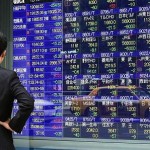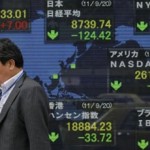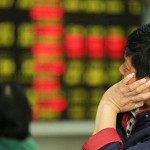Asia mostly higher; Nikkei leads with 2% gain

Asia markets traded mostly higher on Tuesday, with the Japanese benchmark index leading gains in the region.
The Nikkei 225 added 2.04 percent, while across the Korean Strait, the Kospi traded up 0.36 percent. In Hong Kong, the Hang Seng index was down 0.05 percent.
Australia’s ASX 200 also retraced losses to trade up 0.23 percent, boosted by a 1.5 percent gain in the heavily-weighted financials sub-index. The energy and materials sub-indexes remained sharply lower, down 2.86 and 2.94 percent respectively.
Angus Nicholson, a market analyst at spreadbetter IG, said gains in the dollar and a pullback in oil prices would dominate markets in the near-term.
Chinese mainland markets were up, with the Shanghai compositeadding 0.19 percent and the Shenzhen composite up 0.25 percent.
Chinese data showed April’s consumer price index was up 2.3 percent on-year, compared with the median forecast in a Reuters poll for a 2.4 percent increase. In March, consumer prices also rose by 2.3 percent on-year. The producer price index for April, on the other hand, fell 3.4 percent on-year, slightly smaller than the 3.8 percent decline that analysts polled by Reuters had expected.
In the Philippines, the PSE Composite index reversed losses to trade up 0.46 percent, following reports suggesting controversial candidateRodrigo Duterte is set to become the country’s next president.
The mayor of Davao – one of the country’s richest cities in terms of local incomes – previously encouraged extrajudicial killings as a crime-fighting solution, which received backlash and criticism from human rights groups.
Experts said on Tuesday the Duterte administration could undermine the Philippines’ future growth prospects. Rajiv Biswas, chief economist for Asia Pacific at IHS Global Insight, said, “Rodrigo Duterte’s election platform lacked any content regarding his economic policies, creating considerable uncertainty about his future economic reform agenda.”
The Philippine peso strengthened against the dollar, with the dollar/peso pair trading down 0.82 percent at 46.87.
In company news, shares of troubled Japanese airbag-maker Takata retraced some of its near 8 percent losses to trade down 5.59 percent, following reports of additional recalls. The Japanese business daily Nikkei reported the government had urged automakers to recall an additional seven million or so vehicles with faulty Takata air bags sold in the country.
If automakers in Japan comply, the tally of vehicles recalled with Takata air bags worldwide will be roughly 120 million, the Nikkei reported.
Major resources producers in Australia were sharply lower on Tuesday on the back of the decline in commodity prices on Monday.
Chinese iron ore and steel futures dropped sharply on Monday, while base metals on the London Metal Exchange also finished down, with copper off 2.6 percent, aluminum down 2.3 percent and nickel off 5 percent, according to Reuters data.
Nicholson said commodities were set for a tough time in a strong-dollar environment, and “news that China may be pulling back on its aggressive first quarter stimulus is also driving prices lower.”
Shares of Rio Tinto were down 4.26 percent, Fortescue was off by 5.92 percent and BHP Billiton down 5.05 percent.
In the currency market, the dollar index, which measures the dollar’s moves against a basket of currencies, traded at 94.196 as of 11:56 a.m. HK/SIN, after briefly touching the 91 handle in the previous week.
“The market appears to be increasingly uncomfortable maintaining current levels of short-dollar exposure, with continued comments from Fed officials suggesting markets are under-pricing rate hike chances,” said FX strategists at BNP Paribas.
Gavin Parry, managing director at Parry International Trading, added the Fed was “having a hard time in convincing the street that it really wants to be read as dovish, with bond yields low and the dollar higher.”
The Japanese yen traded at 108.74 against the dollar, compared to the 106 level the pair touched late last month following the Bank of Japan’s decision to stand pat on monetary policy.
“Short covering is the primary reason for the strong gains in dollar/yen,” Kathy Lien, managing director of foreign exchange strategy at BK Asset Management, said.
“With everyone from the Bank of Japan governor to the finance minister and prime minister of Japan threatening to intervene if foreign exchange moves become too rapid, speculators are finding fewer reason to be remain short dollar/yen,” Lien added.
The Australian dollar traded at $0.7327, down from levels above $0.76 early last week before the Reserve Bank of Australia surprised markets by cutting its cash rate.
“This has been very bullish for stocks that benefit from a weaker Aussie dollar, in particular tourism-related stocks, exporters and dollar earners,” said Nicholson, adding the Aussie appears to be heading to the $0.71-$0.72 level this week.
Oil prices were mixed during Asian hours on Tuesday, after tumbling nearly 4 percent on Monday in the U.S. session. Global benchmarkBrent retraced losses to trade up 0.44 percent at $43.82 a barrel as of 11:58 a.m. HK/SIN, while U.S. crude futures were down 0.05 percent at $43.42.
Investor focus is on U.S. crude inventory, which Reuters reported was expected to rise, and also on Saudi Arabia’s newly appointed Energy Minister Khalid al-Falih.
Energy plays in Asia were mixed, with shares of Santos down 4.31 percent, Woodside Petroleum lower by 3.73 percent and Inpexreversing losses to trade up 0.51 percent. Chinese mainland oil plays were mixed, with Sinopec losing 0.97 percent and China Petroleum up 0.43 percent.
U.S. stocks closed mixed in high-volume trade on Monday, with the Dow Jones industrial average down 0.2 percent, the S&P 500 closing up 0.08 percent and the Nasdaq composite adding 0.3 percent.
Source: CNBC




























